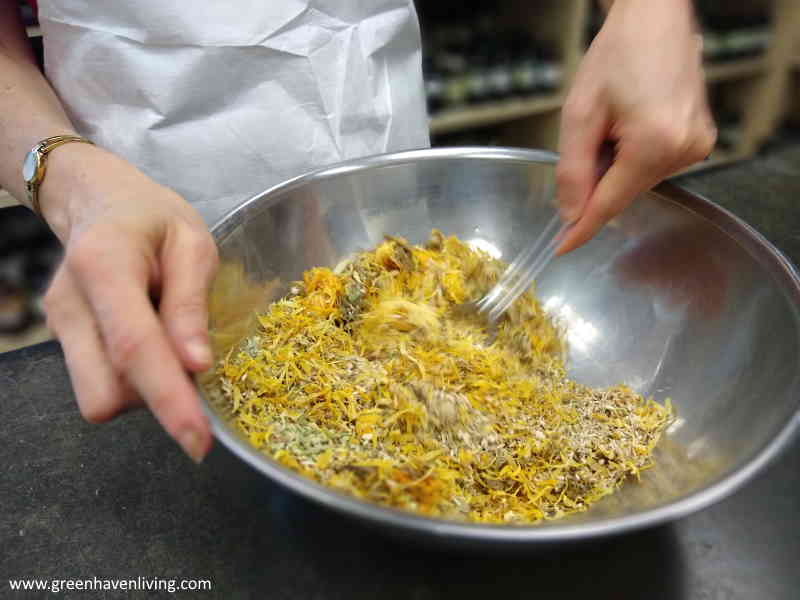
Is it January 2020 already? For me it seems like the holiday season just flew by this year! But that could be largely due to the fact that I was on an extended business trip from the Saturday after Thanksgiving all the way to Christmas Eve morning. I arrived at 4AM that morning, thanks to an emergency landing mid-flight due to mechanical issues – better safe than sorry!
Still, that’s all behind us. I’m looking forward to a new year and, depending on your way of thinking, a new decade. As such, I thought I’d share some food for thought that recently I provided to an aspiring herbalist’s questions:
1. What are some qualities all herbalists should try to cultivate?
This is a great question, and fundamental to being a great practitioner. Herbalists learn much more than just “stuff about herbs”. First and foremost, we learned something called “cultivating a healing presence”. MUIH (the school where I got my degree) spent considerable time trying to define it. Here’s what they came up with:
“Healing Presence is a constellation of personal qualities, relational skills, and professional behaviors that can have a transformational influence on individuals, groups, and communities. Healing Presence is an antecedent to optimal health and healthcare interventions; it transcends technical skill and supports the innate wholeness of individuals and their capacity to heal themselves. The qualities, skills, and behaviors that make up Healing Presence can be intentionally cultivated through specific practices.”
Pretty heady stuff, right? But practically, it’s the feeling that the person sitting across from you is deeply listening, deeply compassionate, empathetic, and on your side to help.
Aside from that, having critical thinking and analytical skills is also very helpful – being able to discern the difference between solid, scientific (or traditional) information versus all of the herbal ‘crap’ that’s out there (and there’s a LOT). Being able to problem-solve, take the information you’ve been given by the client and piece together a holistic picture with which you can use to formulate your treatment strategy is also essential to being effective in helping your client.
Finally, a genuine sense of curiosity and love of plants and nature is essential. Though there are many herbal supplements available in capsule/tablet form, I primarily use whole, unprocessed herbs in teas, powders, concentrated tinctures for my clients. For my way of thinking, an herbalist who doesn’t have a connection to actual plants is really missing something.

2. What misconceptions or biases do herbalists face or have to overcome regarding herbalism?
One is that herbs are replacements for drugs, e.g., taking St. John’s wort instead of Prozac. Herbs don’t work the same way as drugs, and it’s not as simple as just swapping out (you’ll be disappointed if you try that). There’s an entire philosophy of practicing herbal medicine that goes well beyond taking herbs, the whole of which is infinitely more effective than going to the local drugstore and picking up a bottle of whatever. My FAQ explains this herbal philosophy in more detail.
Also, there’s the idea that ‘herbal medicine’ is all just crazy voodoo. Don’t get me wrong, there’s a LOT of crazy stuff out there, and unfortunately that does taint those of us who are solid practitioners with extensive training. When determining the validity of information, look for reputable credentials, cited/referenced information, and/or primary resources (e.g., original authoritative works).
3. Are there any books or organizations that you would recommend for aspiring herbalists?
Oh boy, tons. First, check out the American Herbalists’ Guild. For a super beginner, books by Rosemary Gladstar are pretty accessible (but very basic). Maria Noel Groves also just put out a couple of nice books as well. There are a lot of online herbal courses as well – look for folks who are Registered Herbalists as the primary instructors/really look at their credentials to make sure they’re reputable.

4. What is a simple project I can try as a beginner?
Though a real art to do well and quickly, blending herbal teas is fun – being able to put herbs together in a meaningful way for all sorts of ailments. Find a book (see above) that describes lots of herbs and what they do, then start to experiment with putting them together. You might also find some guidelines on HOW to put them together – dosages, using herbal ‘actions’ for herbal selection, considering the plant part – i.e., it’s not always a good idea to combine a root with a flower because of the differences in density.

If this seems too complicated to start with, start with single herbs. Pick one that intrigues you and/or has a therapeutic action/quality that you desire (mountainroseherbs.com has a great selection of bulk herbs).
Commit to a week-long experiment. Make and enjoy a tea of the herb everyday for a week and note any differences in your body (positive or negative). This will start to get you more observant about your body and the (sometimes subtle) effects herbs may have on it. Noticing ‘no difference’ is also useful information.
I hope I have given you some things to think about in terms of incorporating herbs and herbal philosophies into your life as you head into a new year (or decade?!?). As always, I welcome questions and feedback, so don’t ever hesitate to contact me.

Great post Donna and Happy New Year! What are some simple herbs I can grow at home?
Happy New Year! Anything from the mint family is easy to grow, with a lot of flavor. These herbs include: peppermint, spearmint, lemon balm, sage, thyme, basil, oregano, marjoram. More ‘exotic’ mint-family plants include scullcap, motherwort, and holy basil.